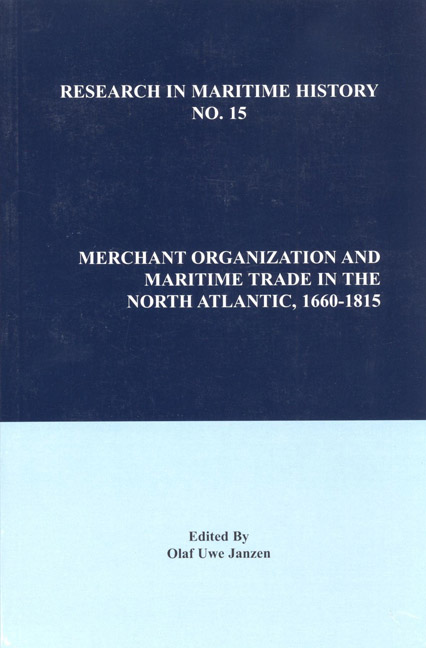Book contents
- Frontmatter
- Contents
- Contributors
- Preface
- CONTRIBUTIONS
- “Introduction”
- “The Gaigneur Clan in the Seventeenth-Century Canada Trade”
- “Credit, Risk and Reputation in Late Seventeenth- Century Colonial Trade”
- “The Huguenot Diaspora and the Development of the Atlantic Economy: Huguenots and the Growth of the South Carolina Economy, 1680-1775”
- “Breaching the Mercantile Barriers of the Dutch Colonial Empire: North American Trade with Surinam during the Eighteenth Century”
- “A Scottish Venture in the Newfoundland Fish Trade, 1726-1727”
- “The Consolidation of Bilbao as a Trade Centre in the Second Half of the Seventeenth Century”
- “Cutting Out The Middleman? American Trade In Northern Europe, 1783-1815”
- “A Vital Link in Wartime: The Organization of a Trade and Shipping Network Between the United States and Bordeaux, 1793-1815”
- “The Challenge of War on Maritime Trade in the North Atlantic: The Case of the British Trade to Iceland During the Napoleonic Wars”
“Breaching the Mercantile Barriers of the Dutch Colonial Empire: North American Trade with Surinam during the Eighteenth Century”
from CONTRIBUTIONS
- Frontmatter
- Contents
- Contributors
- Preface
- CONTRIBUTIONS
- “Introduction”
- “The Gaigneur Clan in the Seventeenth-Century Canada Trade”
- “Credit, Risk and Reputation in Late Seventeenth- Century Colonial Trade”
- “The Huguenot Diaspora and the Development of the Atlantic Economy: Huguenots and the Growth of the South Carolina Economy, 1680-1775”
- “Breaching the Mercantile Barriers of the Dutch Colonial Empire: North American Trade with Surinam during the Eighteenth Century”
- “A Scottish Venture in the Newfoundland Fish Trade, 1726-1727”
- “The Consolidation of Bilbao as a Trade Centre in the Second Half of the Seventeenth Century”
- “Cutting Out The Middleman? American Trade In Northern Europe, 1783-1815”
- “A Vital Link in Wartime: The Organization of a Trade and Shipping Network Between the United States and Bordeaux, 1793-1815”
- “The Challenge of War on Maritime Trade in the North Atlantic: The Case of the British Trade to Iceland During the Napoleonic Wars”
Summary
The Dutch Republic of the seventeenth and eighteenth centuries is often perceived as a bastion of free trade. No doubt, Hugo Grotius’ celebrated publication Mare liberum (The Open Seas) has contributed to that image, although Grotius soon afterwards defended Dutch monopolistic practices. As Immanuel Wallerstein has asserted, nations that enjoy a hegemony of world trade - as the Dutch “carriers of the world” did during the seventeenth century - have the advantage of supporting freedom from restrictions in international trade. However, it has been well established that the Dutch wanted to have it both ways and demand open seas when it suited them and impose restrictions on foreign merchants when they found it to their economic advantage, in both the East Indies (Indonesia) and the West Indies.
Historians generally label the commercial protection against foreign competitors by means of state intervention as mercantilism. Employing this interpretive framework is fraught with dangers, however, because of the different meanings of that theoretical model. Some have even questioned the validity of mercantilism as an interpretive model. Without restating the various interpretations of mercantilism, I am using the term here to signify governmental efforts to prevent subjects of foreign countries to trade in regions under its jurisdiction for the purpose of limiting such rights to its own subjects and thus protect its national economy.
In their Atlantic commerce, the Dutch employed a mixture of mercantilistic protectionism and free trade access, depending on what suited them best. Initially, they had been instrumental in developing the Caribbean region, through capital investment and an efficient merchant marine, into a new system based on “advanced capitalist economics,” in contrast to the exclusive markets of the Spanish and Portuguese American colonies. As England and France began to apply mercantilistic policies during the seventeenth century and the Dutch found their commercial opportunities declining, their commerce became increasingly confined to their own overseas colonies.
Unlike several other European nations, the Dutch Republic was never able to induce much of its own population to emigrate to overseas settlements. This contributed to the failure of both their Brazil and New Nederland settlements. In the Guiana region they were able to provide a supervisory staff to make tropical plantation economies thrive with slave labour brought in from Africa. For these areas the Dutch developed their own protective policies.
- Type
- Chapter
- Information
- Publisher: Liverpool University PressPrint publication year: 2017



